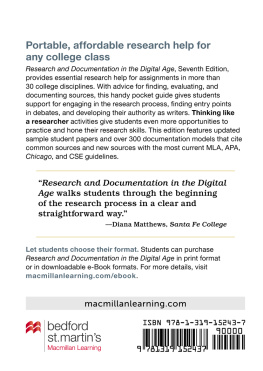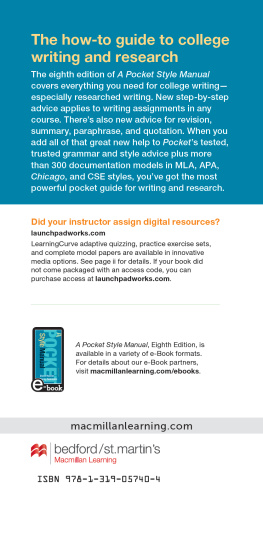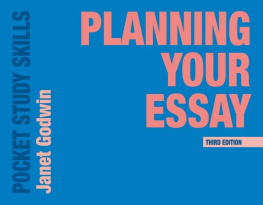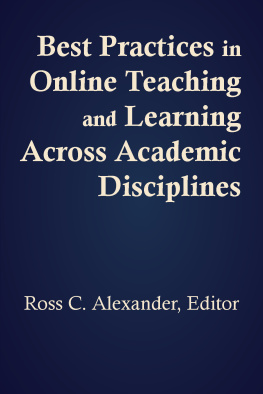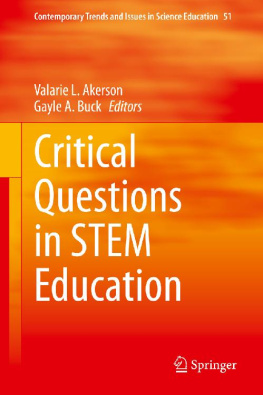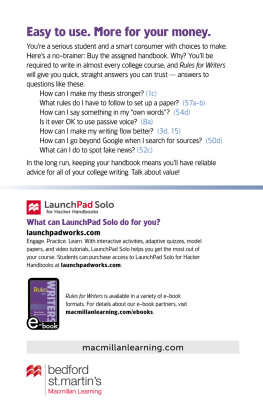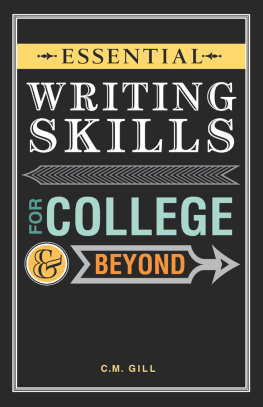Contents
Landmarks
Page List
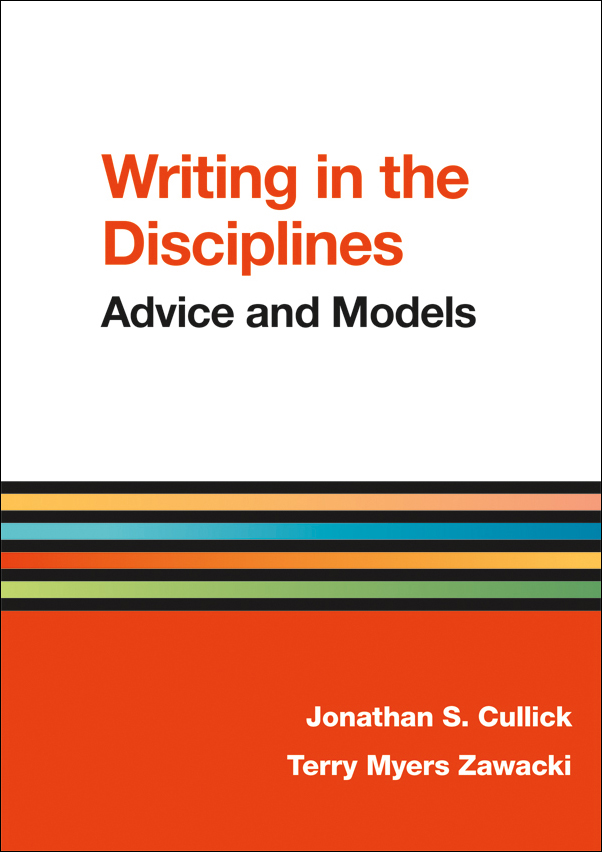
The cover page shows the following information:
The title is Writing in the Disciplines: Advice and Models. The authors are Jonathan S. Cullick and Terry Myers Zawacki.
Writing in the Disciplines
Advice and Models
A Hacker Handbooks Supplement
Jonathan S. Cullick
Northern Kentucky University
Terry Myers Zawacki
George Mason University

DISCIPLINE SPECIALISTS
For their assistance and advice as discipline specialists, we thank the following: Diana Belland, Northern Kentucky University (music); Jules Benjamin, Ithaca College (history); Dorinda J. Carter, Michigan State University (education); Jennifer DeForest, University of Virginia (education); Susan Durham, George Mason University (nursing); C. Dale Elifrits, Northern Kentucky University (geology/engineering); Aimee Frame, University of Cincinnati (engineering); Devon Johnson, George Mason University (criminal justice); Victoria McMillan, Colgate University (biology); James Morris, Harvard University (biology); Kirsten Olson, Wheaton College (education); Shannon Portillo, George Mason University (criminal justice); Sherry Robertson, Arizona State University (business); and Beth Schneider, George Mason University (business).
Copyright 2018, 2015, 2011 by Bedford/St. Martins
All rights reserved. No part of this book may be reproduced, stored in a retrieval system, or transmitted in any form or by any means, electronic, mechanical, photocopying, recording, or otherwise, except as may be expressly permitted by the applicable copyright statutes or in writing by the Publisher.
210987
fedcba
For information, write: Bedford/St. Martins, 75 Arlington Street,
Boston, MA 02116
ISBN 978-1-319-13363-4 (epub)
ACKNOWLEDGMENTS
Jules Benjamin, Wage Slavery or True Independence? Women Workers in the Lowell, Massachusetts, Textile Mills, 18201850, excerpt from A Students Guide to History, Eleventh Edition. Copyright 2010 by Bedford/St. Martins. Reprinted with permission.
Valerie Charat, Always Out of Their Seats (and Fighting): Why Are Boys Diagnosed with ADHD More Often Than Girls? (December 15, 2006). Reprinted with permission.
Onnalee L. Gibson, A Reflection on Service Learning: Working with Eric (April 25, 2006). Reprinted with permission.
Tom Houston, Concert Review (February 27, 2008). Reprinted with permission.
Marin Johnson and Laura Arnold, Distribution Pattern of Dandelion (Taraxacum officinale) on an Abandoned Golf Course (September 13, 2005). Reprinted with permission.
Victoria McMillan, excerpt from Writing Papers in the Biological Sciences, Fourth Edition. Copyright 2006 by Bedford/St. Martins. Reprinted with permission.
Alice OBryan, Site Stabilization Plan for Erosion Control (May 5, 2008). Reprinted with permission.
Kelly Ratajczak, Proposal to Add a Wellness Program (April 21, 2006). Reprinted with permission.
Julie Riss, Acute Lymphoblastic Leukemia and Hypertension in One Client: A Nursing Practice Paper (May 18, 2006). Reprinted with permission.
Brian Spencer, Positively Affecting Employee Motivation (March 9, 2006). Reprinted with permission.
Chris Thompson, Crime in Leesburg, Virginia. Reprinted with permission.
D
Writing in the Disciplines
Advice and Models
D1 Introduction: Writing in different disciplines
Succeeding in college requires performing well in different kinds of courses and on various kinds of assignments. You know you will be assigned writing in your college writing courses, but it may surprise you to know that other college courses require writing courses you might not expect, like nursing and psychology. The strategies you develop in your first-year composition course will help you write well in other academic courses.
The academic community is divided into several broad subject areas called disciplines. The disciplines are generally grouped into five major fields of study, which are further broken down into more specific subjects.
Social sciences (psychology, sociology, criminology)
Natural sciences (biology, physics, chemistry)
Mathematics and engineering
Humanities and the arts (history, literature, music)
Professions and applied sciences (business, education, nursing)
Each discipline has its own set of expectations and conventions for both reading and writing. Some of the expectations and conventions writing with a clear main idea, for instance are common across disciplines; those are covered in your handbook. Other expectations and conventions are unique to each discipline. These include the following:
When you are asked to write in a specific discipline, start by becoming familiar with the distinctive features of writing in that discipline. For example, if you are asked to write a lab report for a biology class, your purpose might be to present results of an experiment. Your evidence would be the data you collected while conducting your experiment, and you would use scientific terms in your report. You would also use the CSE (Council of Science Editors) guidelines for citing sources and formatting your work. If you are asked to write a case study for an education class, your purpose might be to analyze student-teacher interactions in a classroom. Your evidence might be a combination of personal observations and interviews. You would use terms from the field in your case study and cite your sources using the guidelines of the American Psychological Association (APA).
The following sections provide guidelines for writing in nine disciplines: biology, business, criminal justice/criminology, education, engineering, history, music, nursing, and psychology. Each section begins with advice about the expectations for writing in that discipline and closes with a model or two of student writing.
D2 Writing in the biological sciences
Biologists use writing in many ways. They write reports analyzing the data they collect from their experiments as well as reviews of other scientists research or proposed research. They write proposals to convince funding agencies to award grants for their research. If they teach, biologists also write lectures. Some biologists may communicate with a general audience by writing print or online news articles. In addition, they may lend their expertise to public-policy decision making with advisory comments on issues such as climate change or stem cell research.
When you write in biology courses, your goal will generally be to convince readers of the validity of the conclusions you draw from observations, from experimental data, or from your evaluations of previously published research. For most assignments, you will need to use a scientific style of writing, conveying your information to readers as succinctly and accurately as possible.
D2-a Determine your audience and their needs in the biological sciences.
When you write in biology, your audience may consist of researchers, professors, other students, and sometimes members of the government or business communities and the general public. Researchers or teachers may read to find out the results of an experiment, an analysis of new data, or information supporting or critiquing a theory. They may need this information to guide their own research projects or improve their assignments and classroom materials. Students read to learn about major concepts and discoveries as well as methods for conducting laboratory experiments. Researchers, teachers, and students expect detailed, specific presentation of data and findings in words and in graphic form, such as diagrams and charts. Members of the general public want to understand how concepts affect personal decisions they must make about issues such as medical care or nutritional choices. People working in government or business may have to make decisions about funding for research proposals. For more general audiences, you may not need to provide the same level of detail. For example, everyday readers may not need species names to be written in Latin. In all cases, however, your readers expect you to be completely objective and to present information as clearly as possible.


